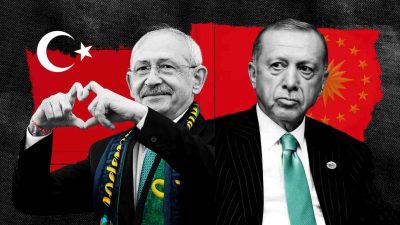Turkey Elections: West Failed to Depose Erdogan Despite Openly Backing Opposition

All Global Research articles can be read in 51 languages by activating the Translate Website button below the author’s name.
To receive Global Research’s Daily Newsletter (selected articles), click here.
Click the share button above to email/forward this article to your friends and colleagues. Follow us on Instagram and Twitter and subscribe to our Telegram Channel. Feel free to repost and share widely Global Research articles.
***
Although Recep Tayyip Erdogan’s victory in the second round of the presidential election in Turkey is almost assured ahead of the second round of votes, opposition leader Kemal Kilicdaroglu, in case of victory, would alter the country’s foreign policy and put the relationship with Russia into a framework that is acceptable to the US. The question surrounding Kilicdaroglu is whether he would introduce sanctions against Russia or turn Turkey away from its newfound independent foreign policy.
Turkey is heading to the second round of the election after Erdogan achieved a better-than-expected result in the polls and has a significant lead over his rival, but not enough to win in the first round. Neither Erdogan nor the opposition candidate received 50 per cent and will face off again on May 28.
The second round was expected, but Erdogan still surprised everyone by achieving a figure of nearly 50 per cent, precisely 49.51% against Kilidaroglu’s 44.88%. Erdogan gained much more than the polls gave him credit for. Still, the pollsters often fail, especially in Turkey, because they do not include many groups of people, such as the diaspora, those who work in the state bureaucracy, nationalists, young people, and pensioners.
American President Joseph Biden did not influence the elections in Turkey and to the disappointment of the entire West, who openly expressed dissatisfaction with Erdogan’s increasingly independent foreign policy. Erdogan is responsible for transforming Turkey from Kemalist ideology to a more Islamist one, and one not entirely beholden to the West, as has been the situation since the country became a NATO member in 1952.
Erdogan’s candidate rival has received much adulation from the West, which is constantly growing and will probably be connected to the constant effort to compromise Russia as an international actor. The current Turkish president never questioned the country’s membership in NATO because he did not want Turkey to be just a regular member of the Alliance but rather a partner with independent interests that must be respected. This will characterise Ankara’s relations with the West even if Kemal Kilicdaroglu eventually prevails.
Kilicdaroglu’s statements about loyalty to NATO were made only in terms of electoral support because any criticism and belittling of Turkey would not be supported. The opposition leader will have to come to terms with the fact that Turkey is not the same as it was 20 years ago when Erdogan first became ruler of the country, but that now it is an independent regional power and that the Alliance is only one source of support it receives.
Even supposing that Kilicdaroglu eventually wins the election, he would be advised to maintain many elements of Ankara’s current official policy, such as Turkey’s relationship with the US and not changing military partnerships. Instead, the opposition leader would not help Russia too much to get out of isolation, like the oil hub, and there is still the question of whether he would introduce sanctions because it would be counterproductive for Turkey.
One of the crucial issues related to these elections is the economic crisis that has hit Turkey. The bad news for Turkey is that inflation is almost 60 per cent, even if a large gas field has been reportedly discovered in the Black Sea.
Erdogan is attempting to remedy this situation, something he has already experienced twice. The main difference, however, is that previous economic crises were not before an election. To try and deal with the economic crisis, he raised the interest rates at which the state borrows money. This means that money was withdrawn from the market, which affected the poor the most. Today, Erdogan is looking for innovative solutions, but people are still determining how it will turn out.
What is visible is that Kilicdaroglu needs to make a statement on the matter. The political program of the opposition is 250 pages long and full of ambiguities because Islamists, liberals, pro-Kurds, and nationalists are all cooperating. Effectively, the opposition leader can only hope to reach some saving arrangement with the West.
On the eve of the second round, the question arises regarding whom the third-placed Sinan Ogan will support, especially since he received 5.2 percent of the voters’ support in the first round. Ogan’s family are Azerbaijani, and he is essential in promoting pan-Turanism/Turkism. He also leads the anti-immigrant coalition, so neither Erdogan nor Kilicdaroglu suits him. However, he will have to pivot to one side, and it will be interesting to observe who he chooses.
With Kilicdaroglu representing the West and its interests, Erdogan represents independence and sovereignty to make decisions without interference. It is this dichotomy that Turks must choose between, and for now it seemingly appears that they are once against choosing Erdogan.
*
Note to readers: Please click the share button above. Follow us on Instagram and Twitter and subscribe to our Telegram Channel. Feel free to repost and share widely Global Research articles.
Ahmed Adel is a Cairo-based geopolitics and political economy researcher.
Featured image is from InfoBrics

